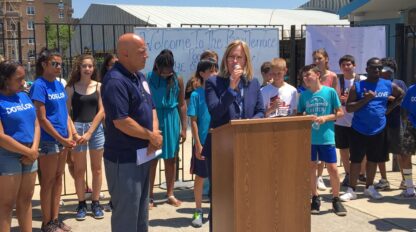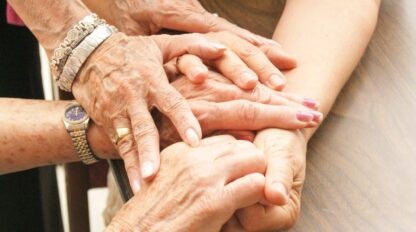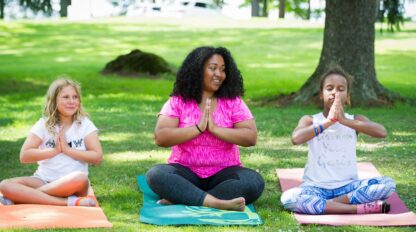Commonpoint Queens Celebrates Black History Month
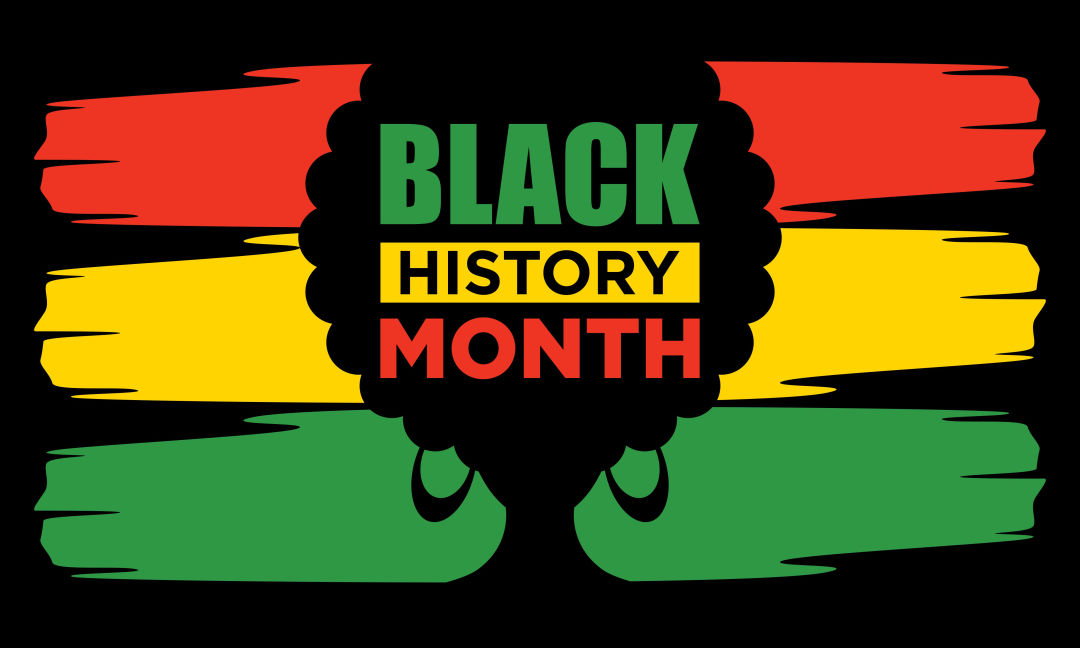
Commonpoint Queens celebrated Black History Month in its programs across all ages with art projects, performances, essays and lessons. You can check out some of our exhibits and sentiments below:
Additionally, community members are invited to join us on Wednesday, February 23rd at 7pm for a Black History Month Trivia Event, where winners will win some great Commonpoint Queens swag. You can join us by clicking here!
[accordion_wrapper]
[accordion title=”After School Programs” state=”closed”]
After School at the Sam Field Center
Students put together a collage about Dr. Martin Luther King Jr., and took each of their components of the collage to write about what freedom and equality mean to them.
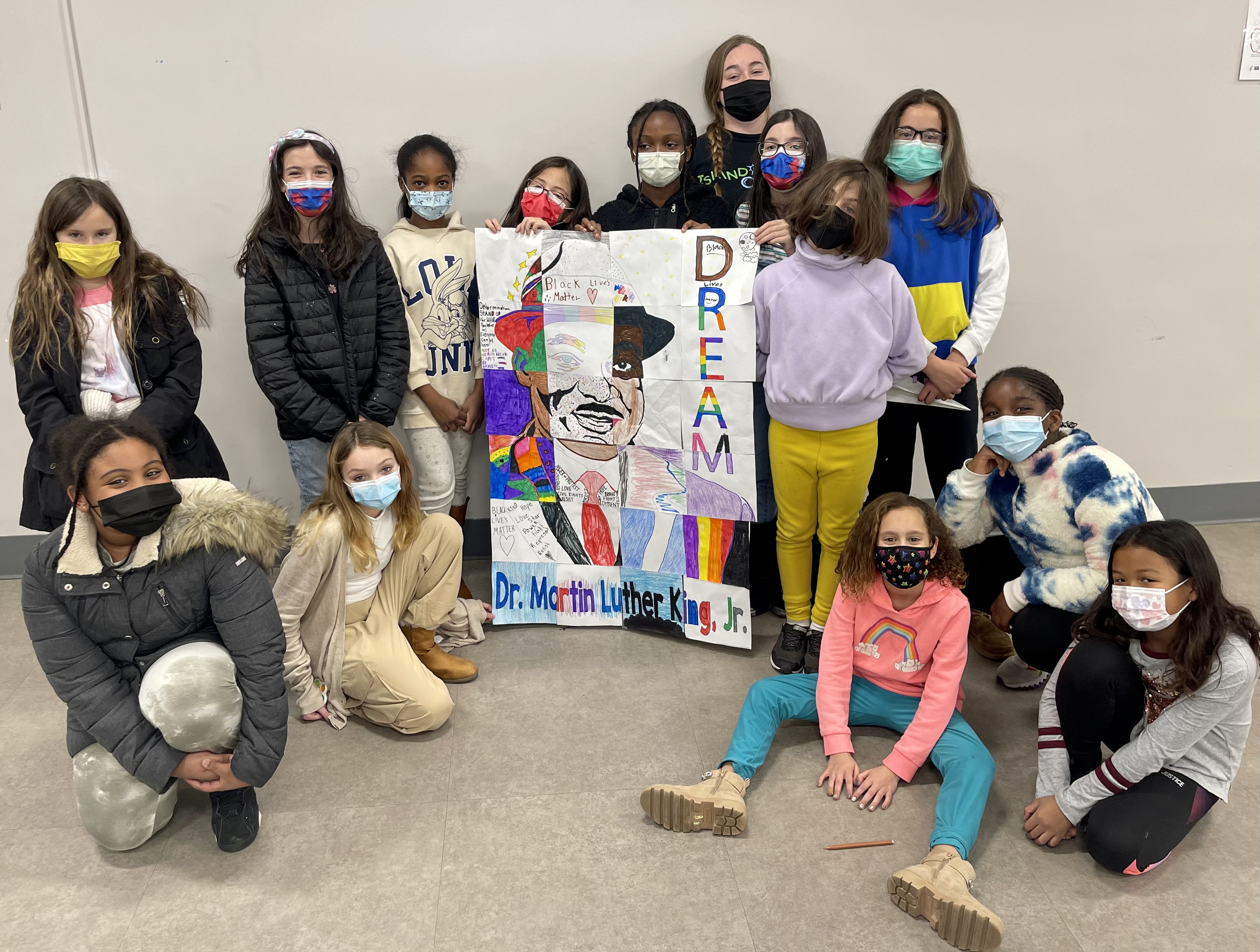
Special Services at the Sam Field Center
We learned about Alma Woodsey Thomas, who was the first African American woman to have a solo exhibition at New York’s Whitney Museum of American Art. She also exhibited her paintings at the White House three times, and was famous for abstract pieces of art. Inspired by Thomas, our students made their own abstract pieces of art.
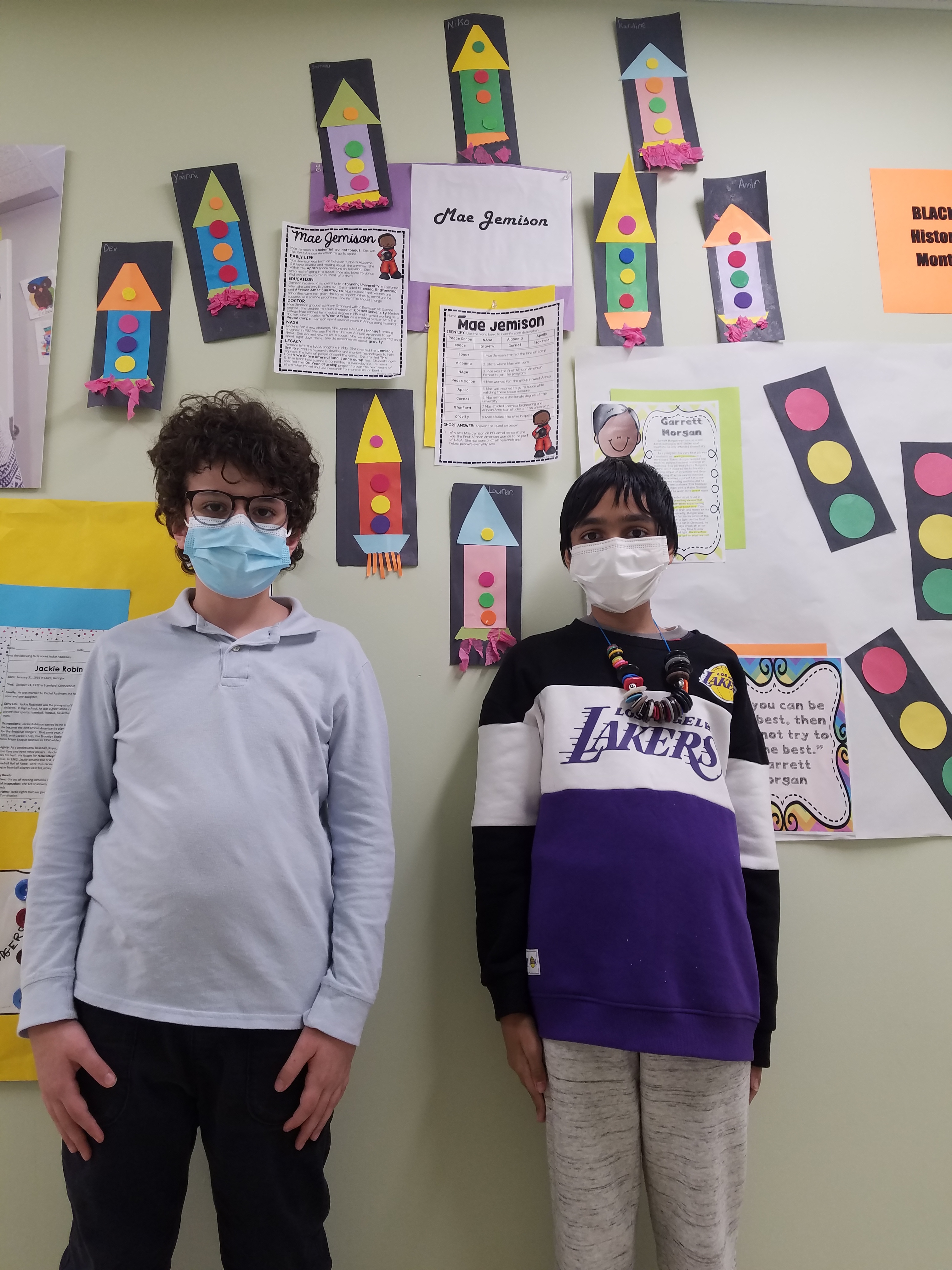
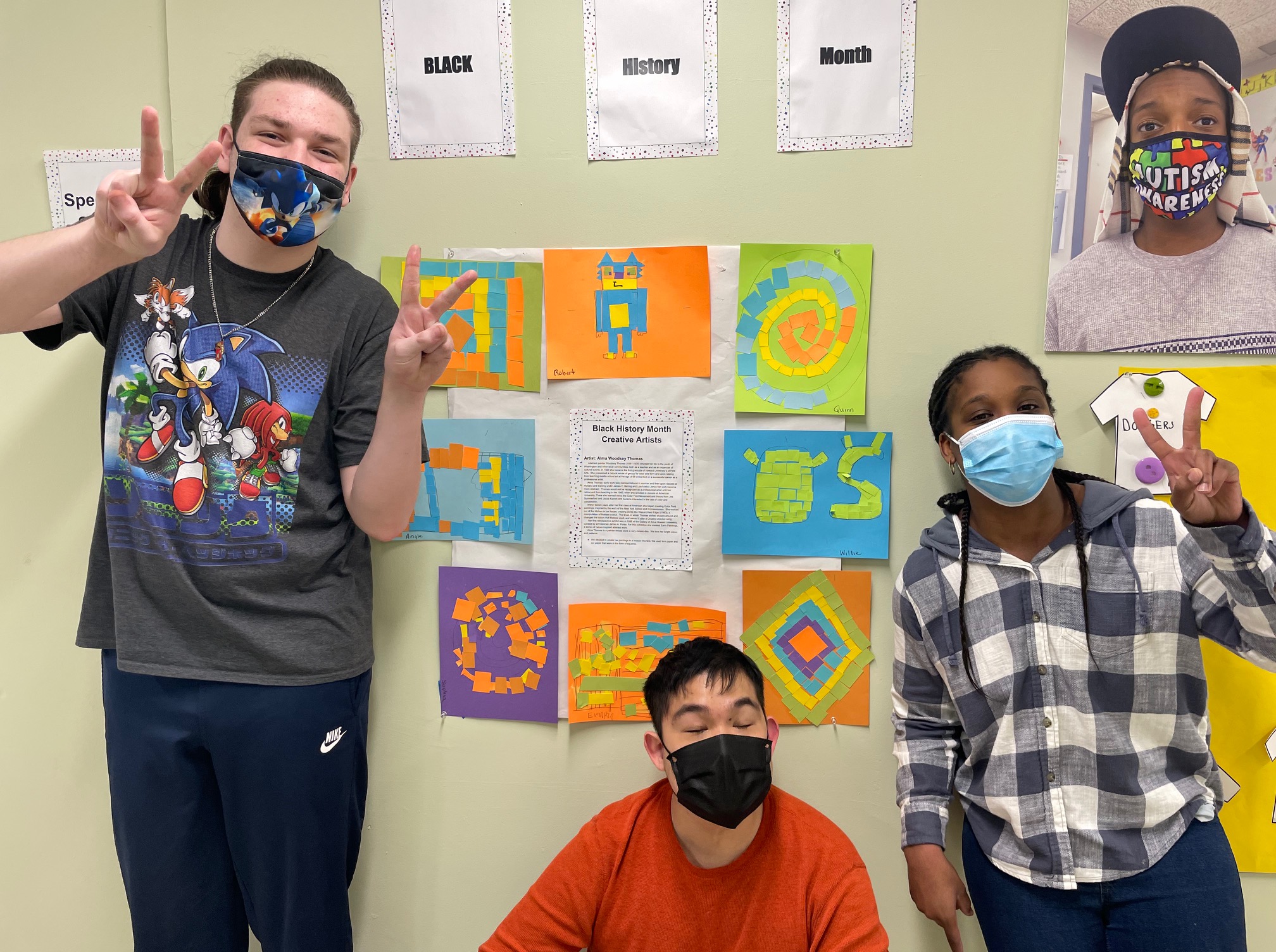
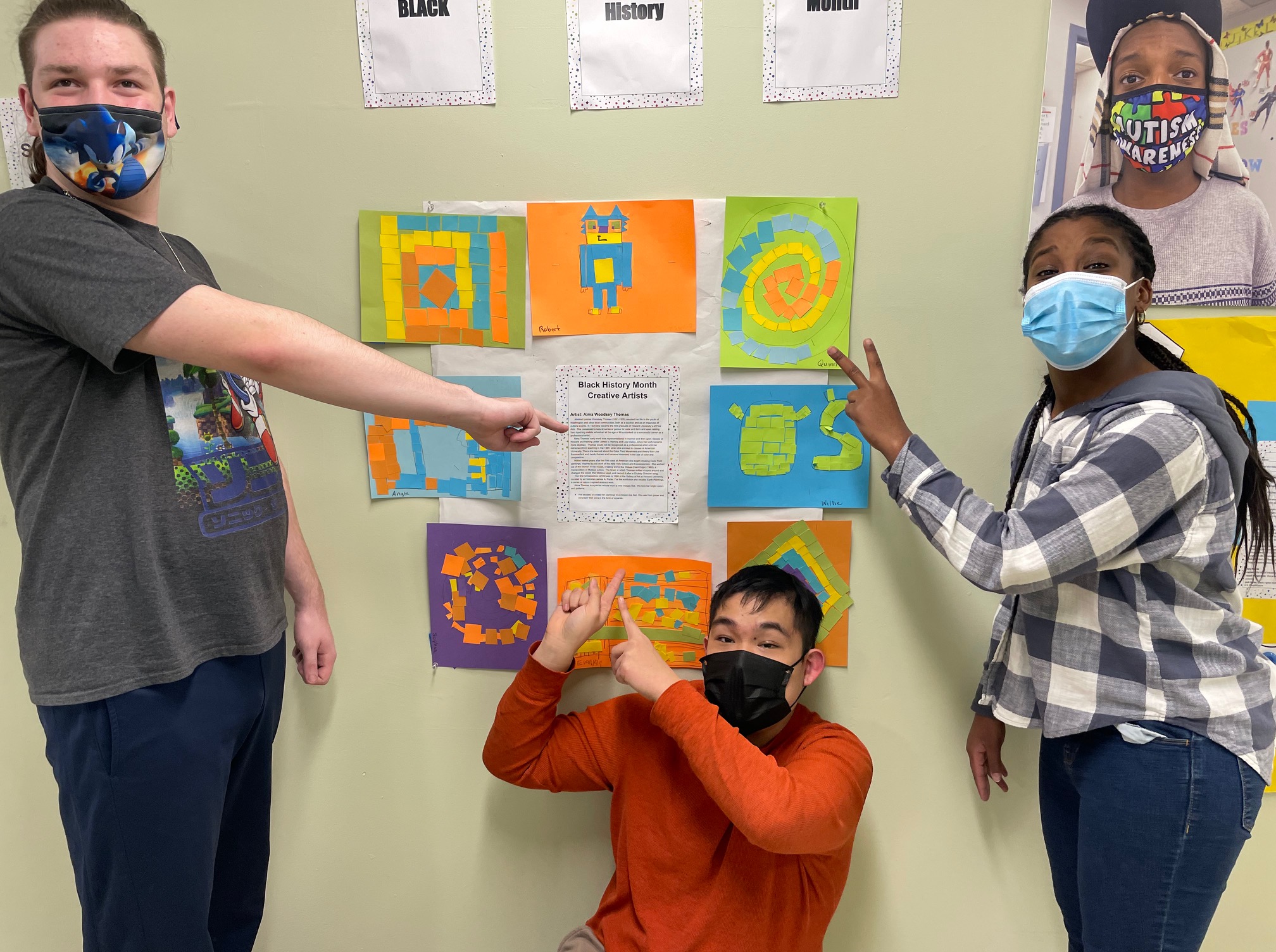
Project Child
Our students learned about famous African Americans in politics, the civil rights movement and sports, and we made art projects depicting historical figures who inspired us the most.
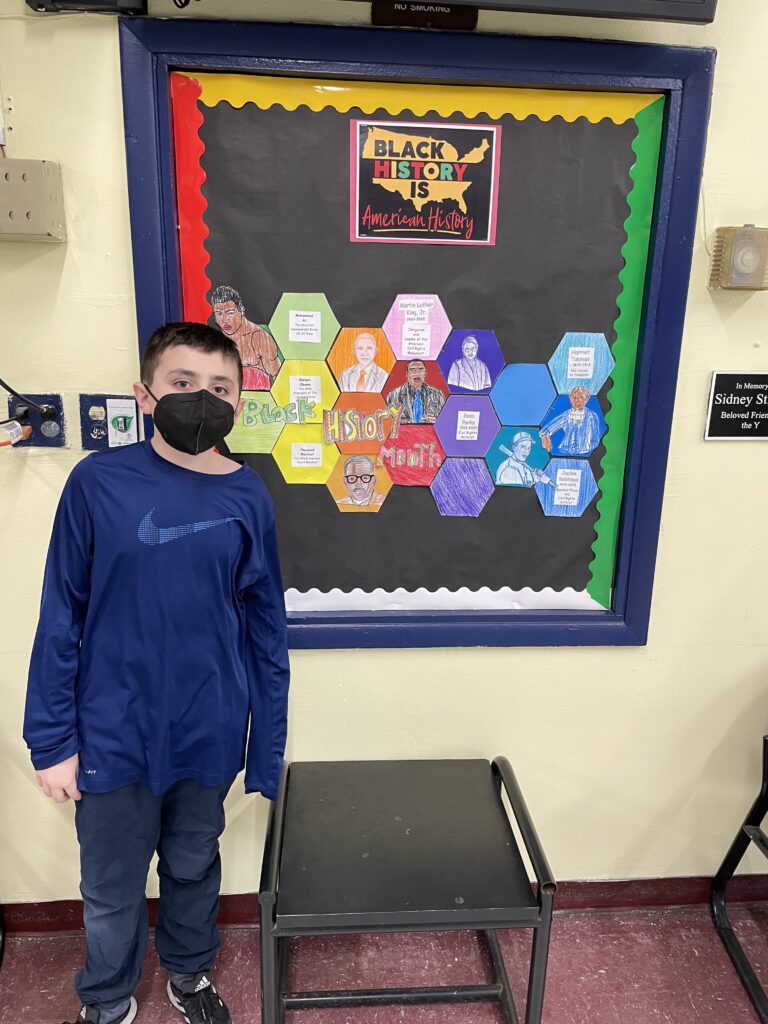
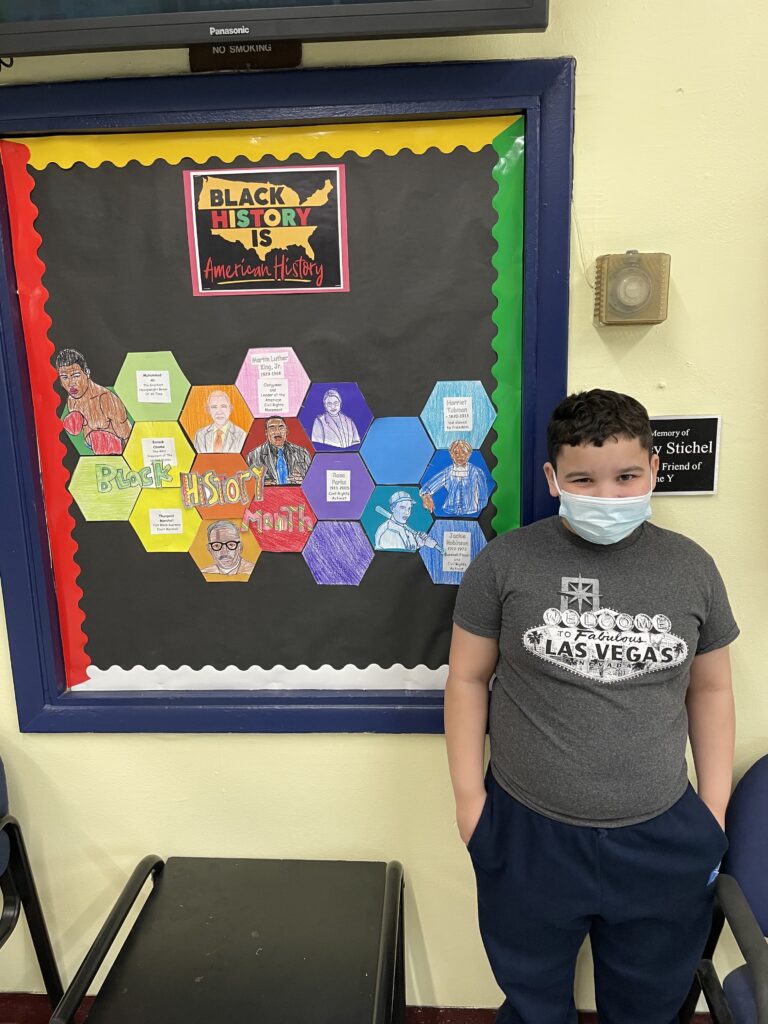
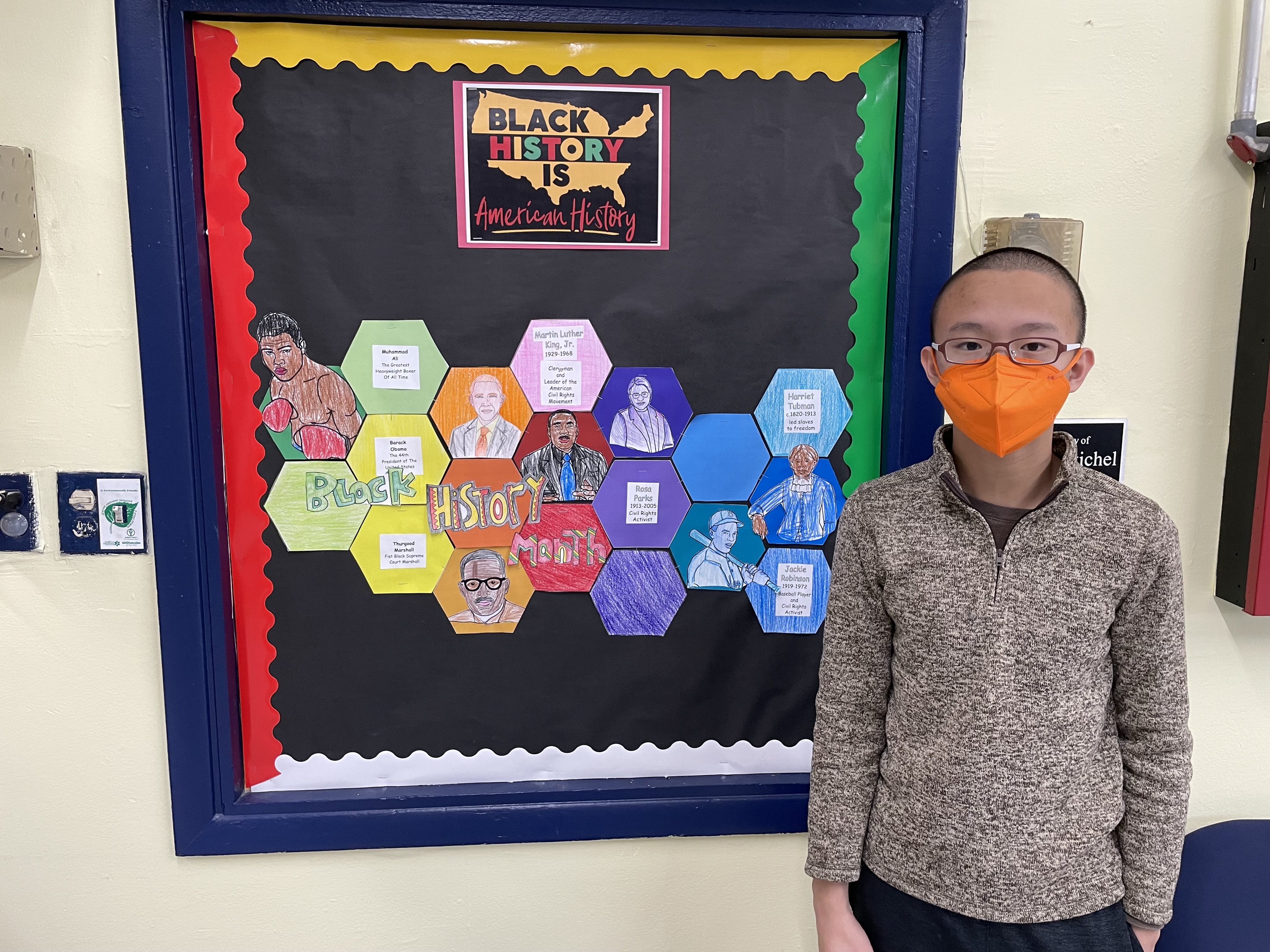
P.S.115
Students learned about Dr. Martin Luther King Jr. and his famous I have a Dream speech, and made art projects telling about their dreams for community and togetherness.
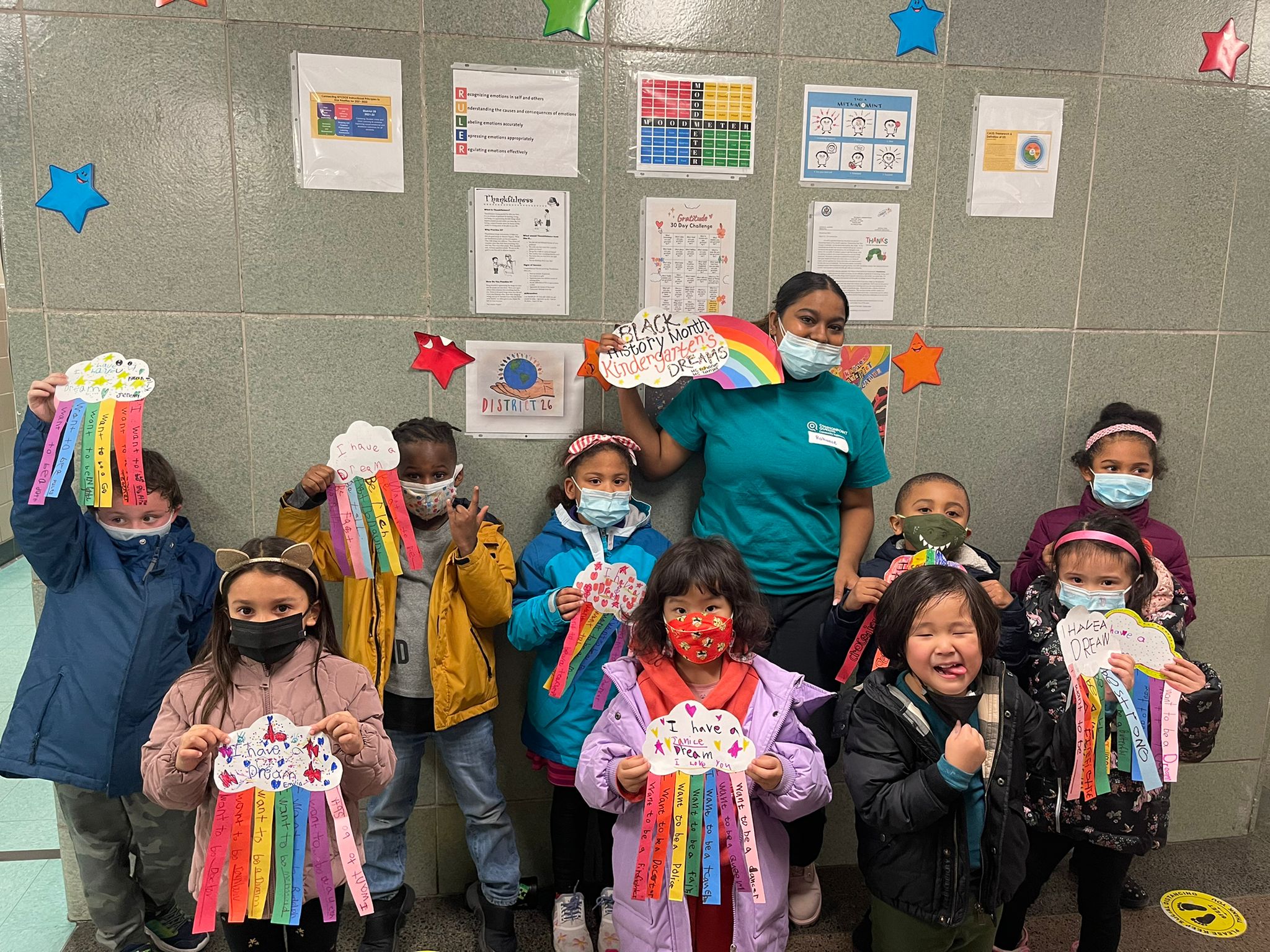
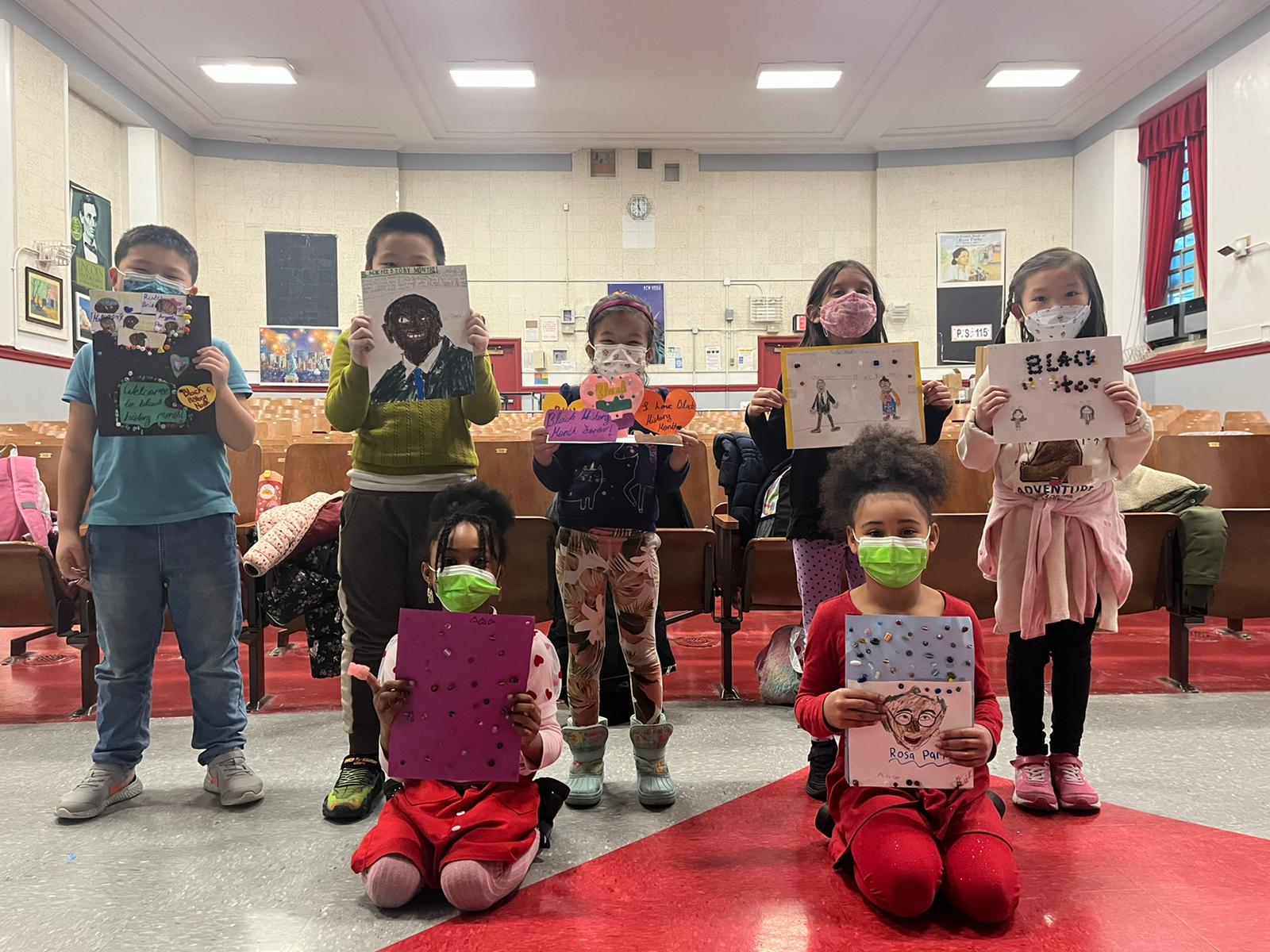
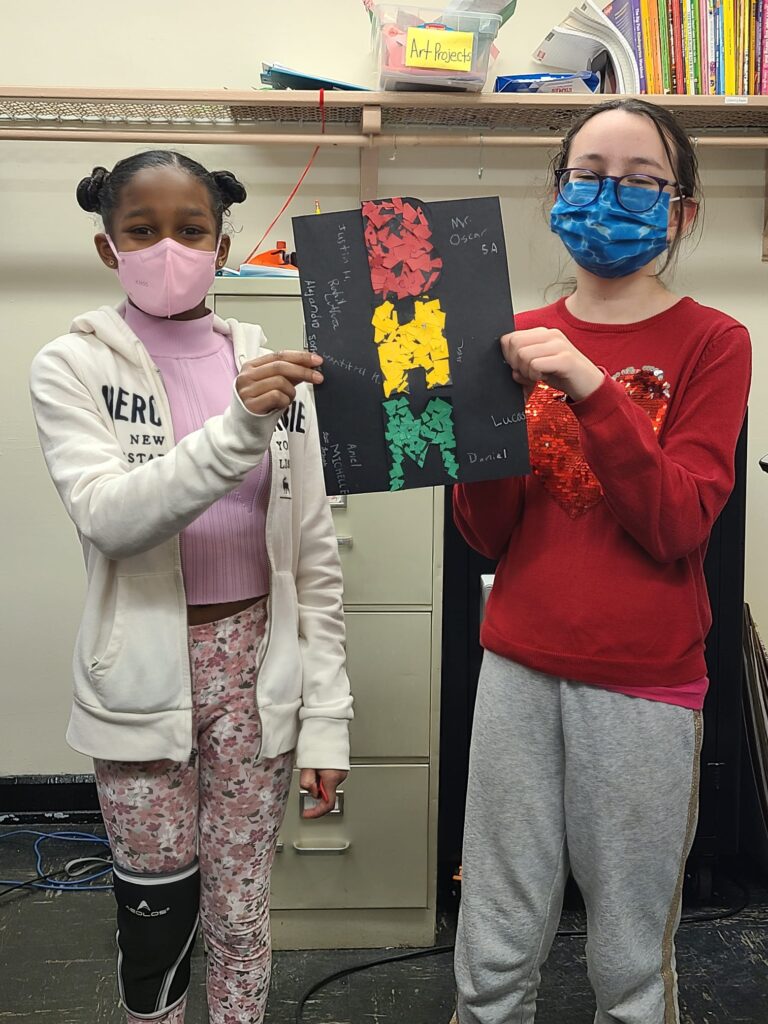
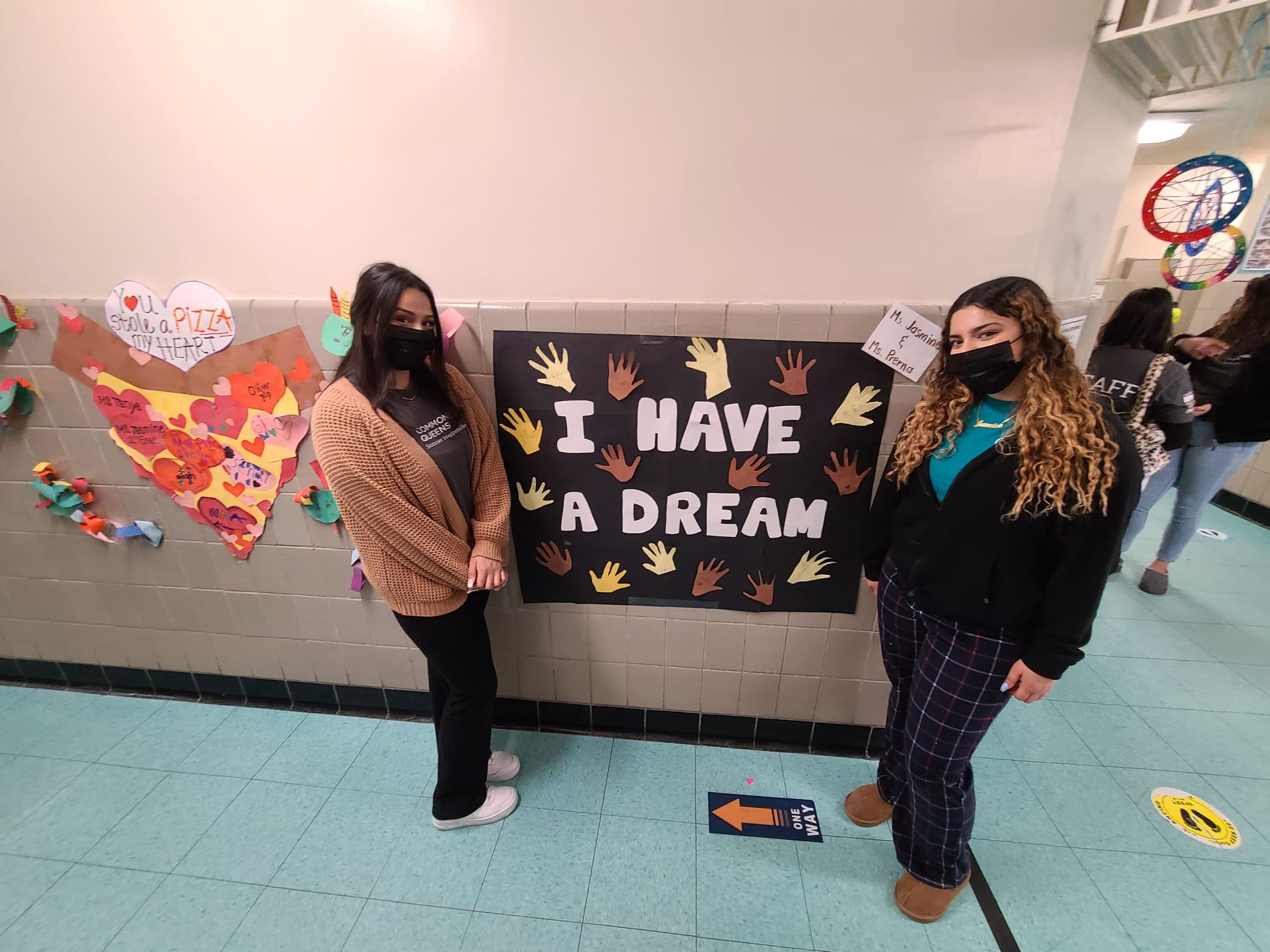
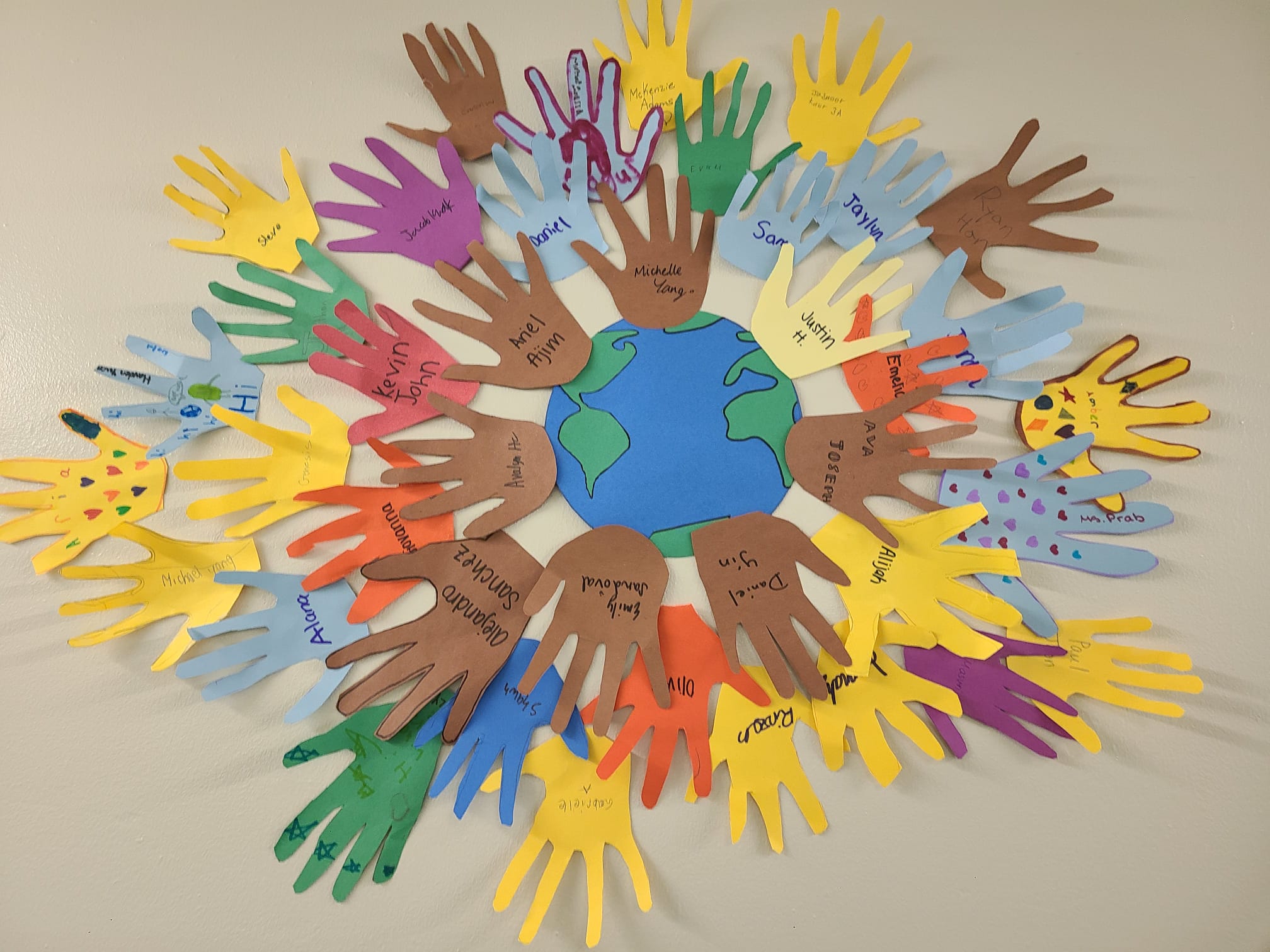
P.S. 55
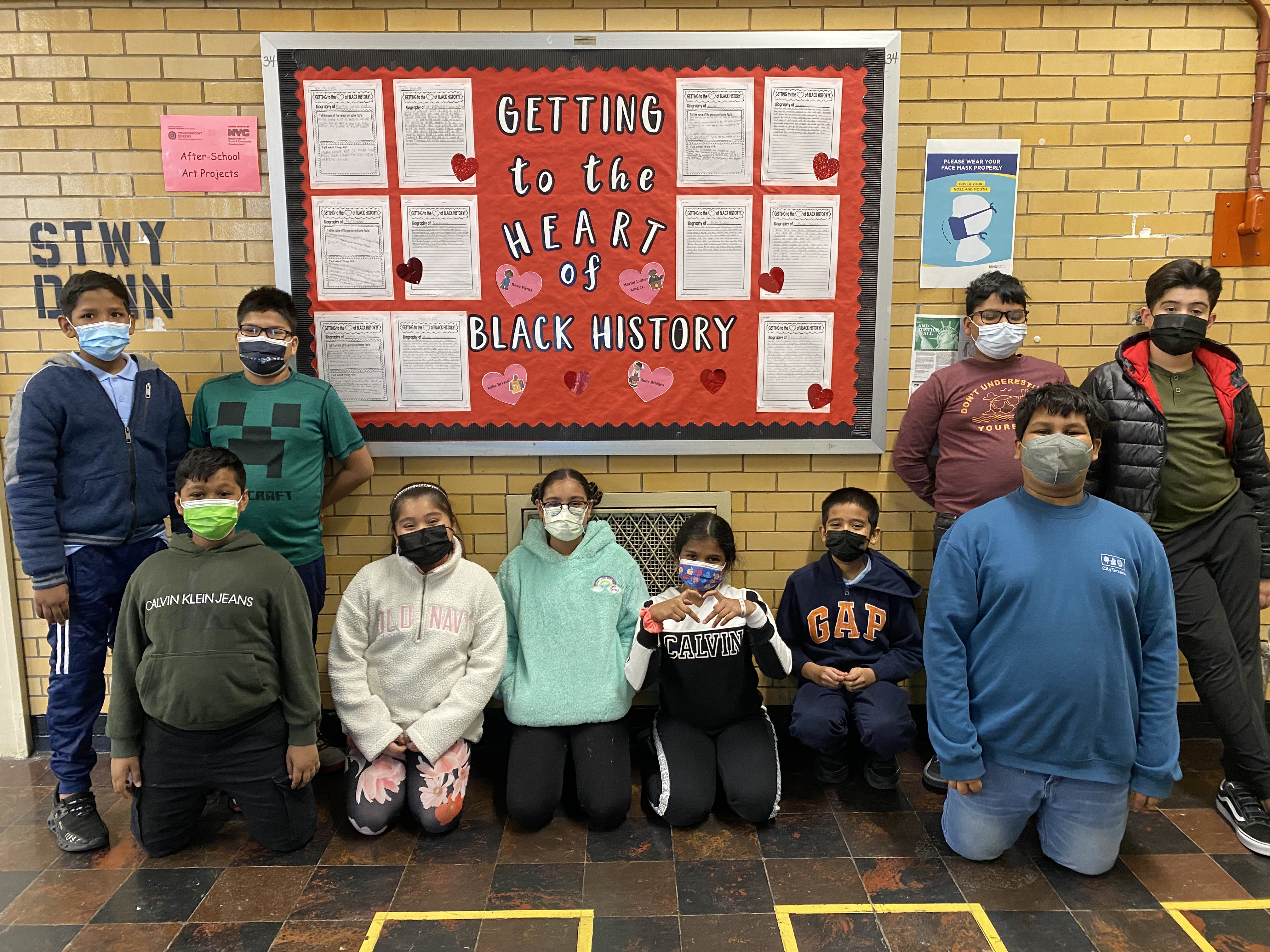
M.S. 158
Students reflected on what Black History means to them, and how it is incorporated into not just American history, but American culture every day and month of the year. Our talented Outreach Coordinator, Noni Murphy, also shared a cooking lesson with us where she teaches how to make Cornbread (and why it’s so significant to her) and how African American history has contributed to American cuisine.
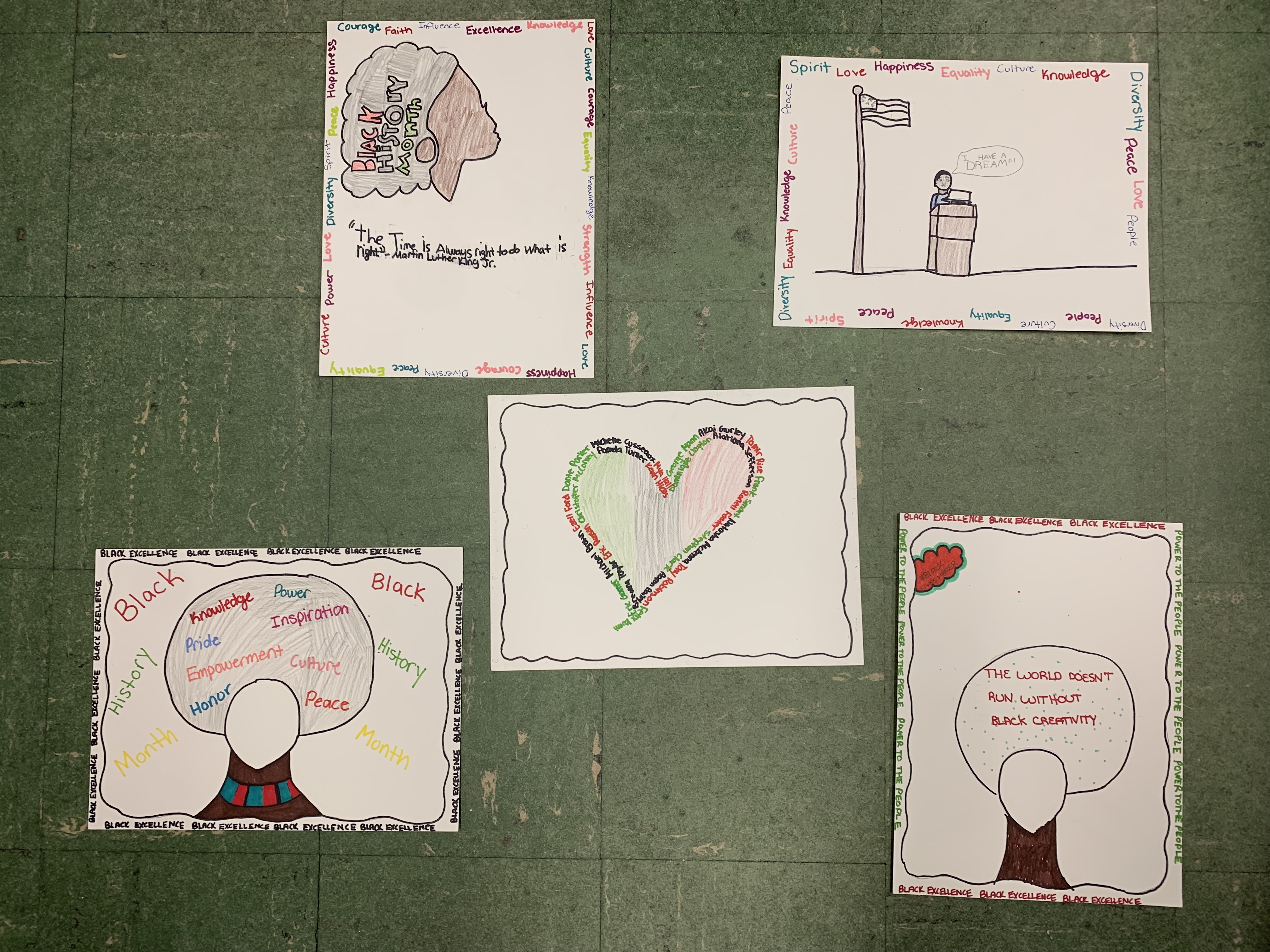
CASE Academy at Forest Hills High School
Our students made an art exhibit board for the rest of the school where they showcased some of their favorite and most inspirational historical figures, as well as what this month means to them.
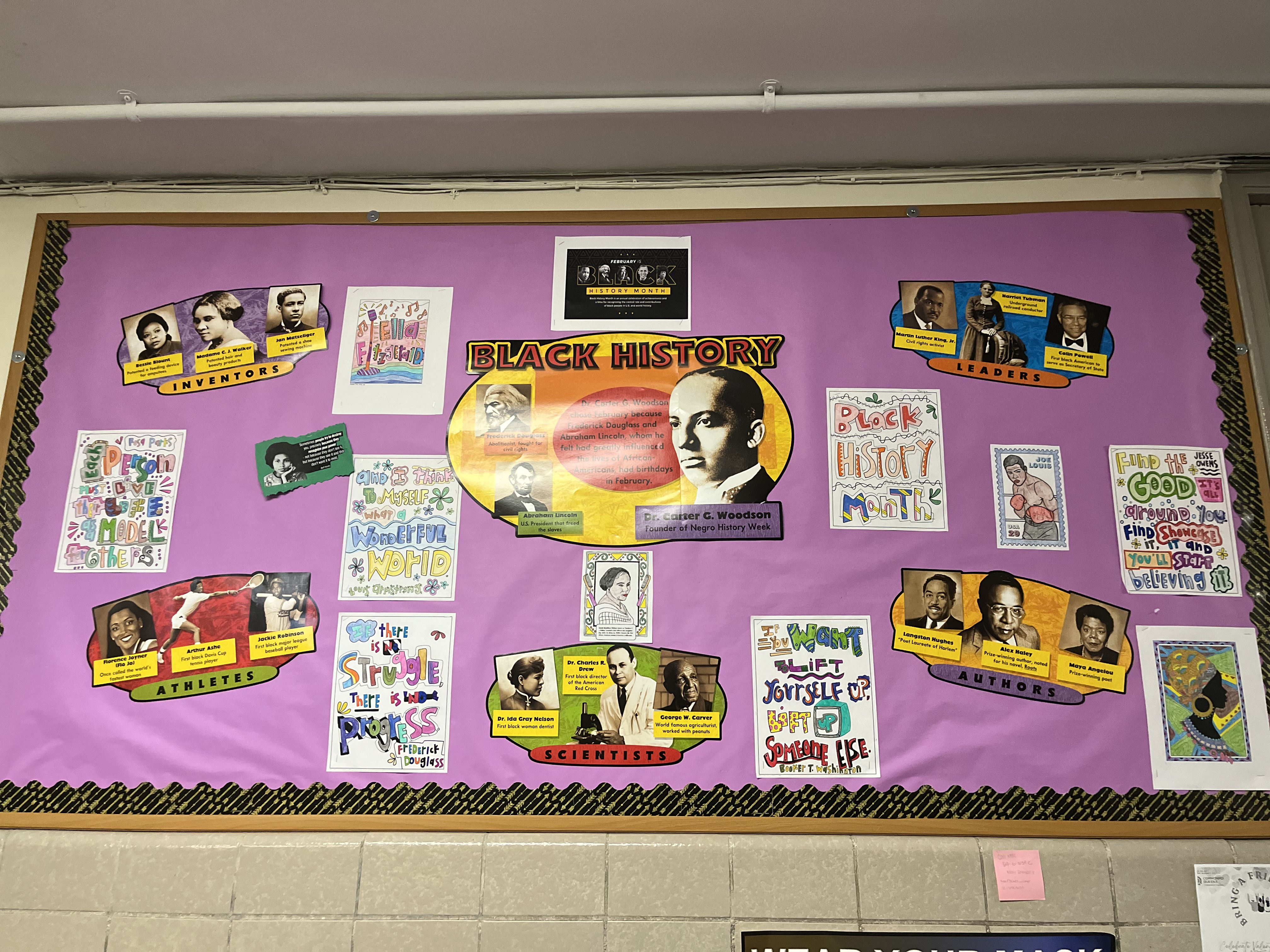
P.S./I.S. 266
Last but certainly not least, our friends at P.S./I.S. 266 hosted a virtual Black History Month Showcase on Friday, February 18th. Students performed dances, read essays, and shared video clips celebrating black history, featuring accomplished musicians, athletes and civil rights leaders.
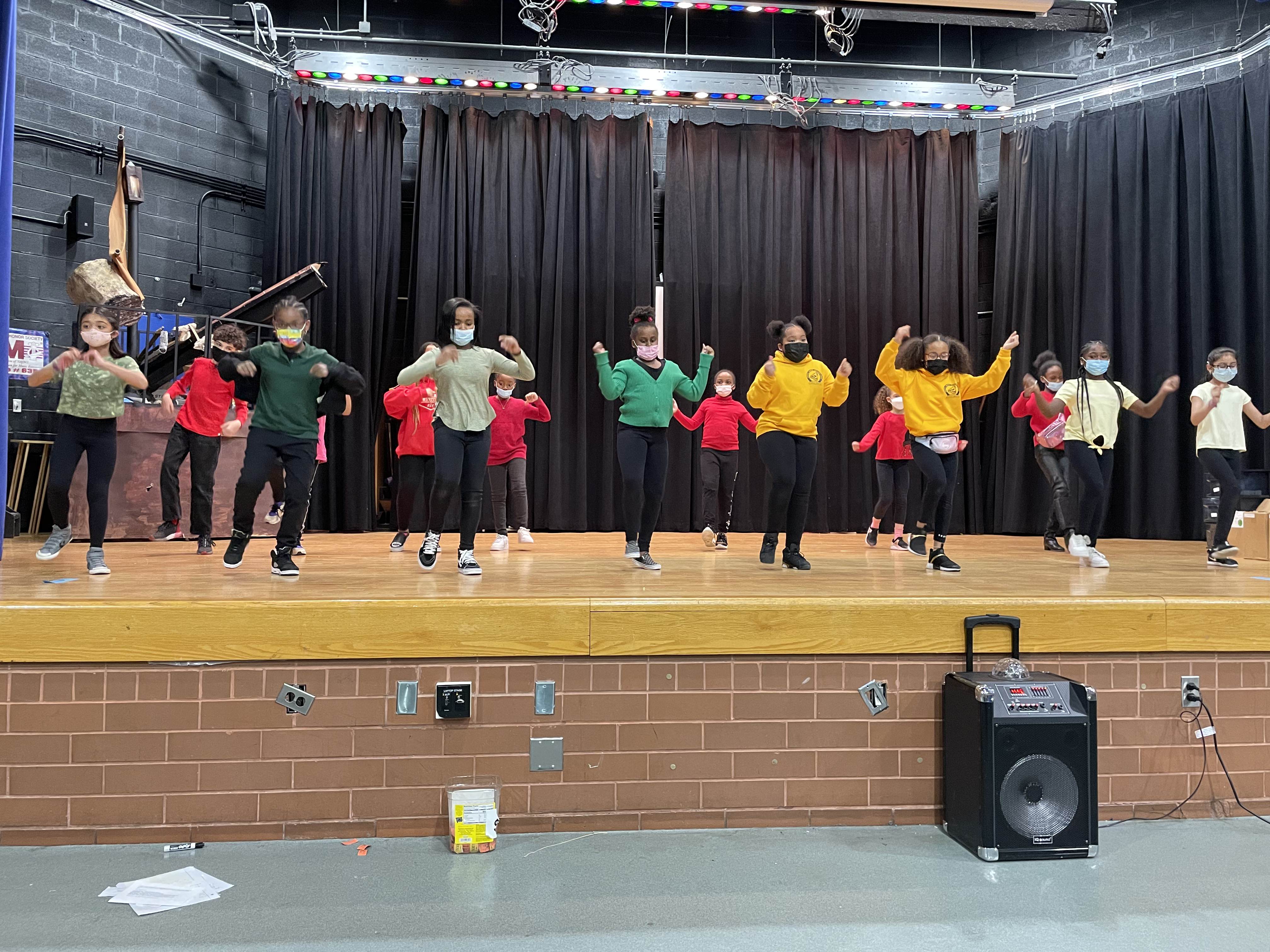
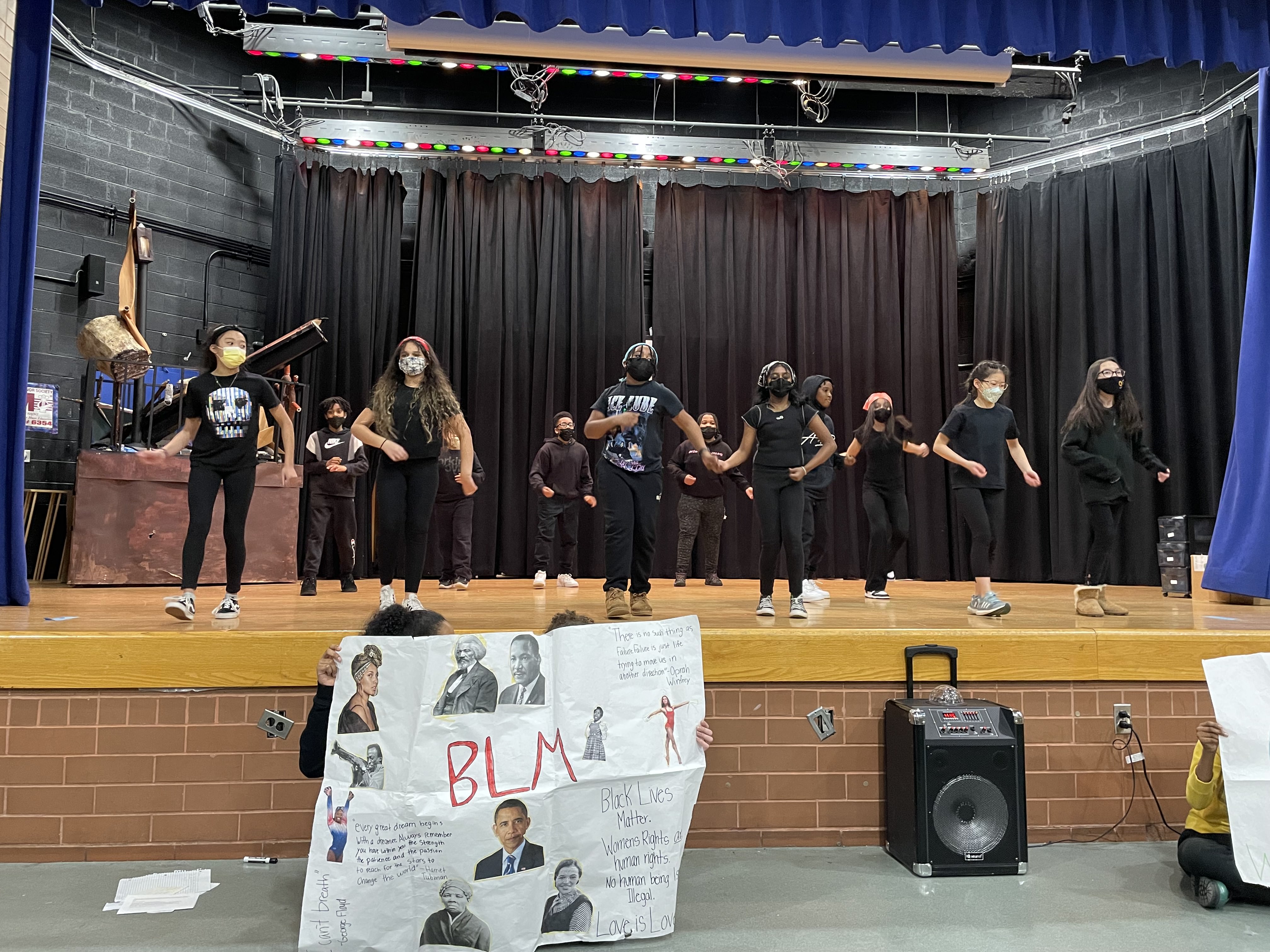

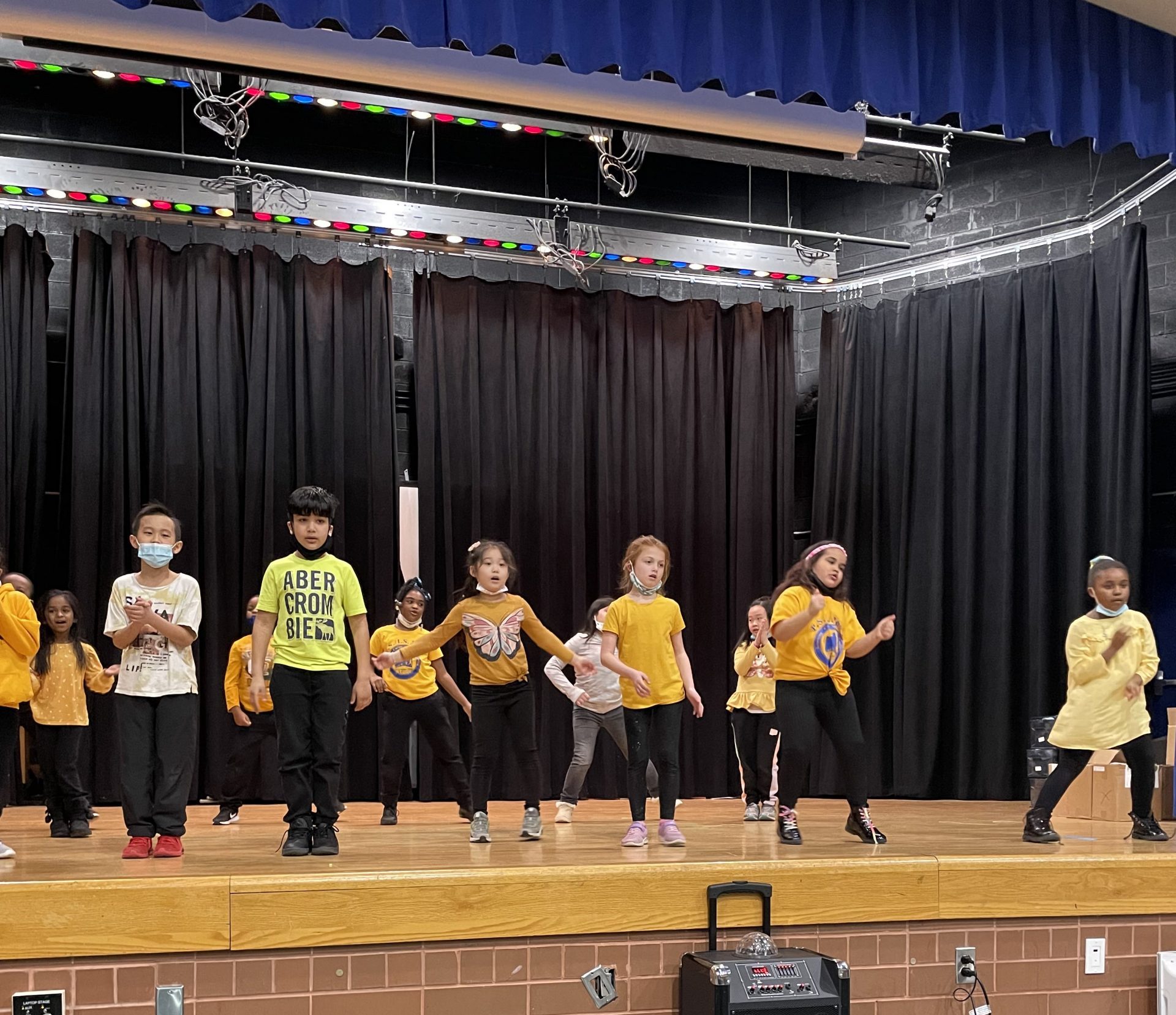
[/accordion]
[accordion title=”Staff and Community Member Essays” state=”closed”]
“I was a 13-year-old African American girl living in Tupelo, Mississippi in 1992. That year marked thirty-eight years since Brown v. Board of Education Supreme Court Decision to integrate our schools and it was also when I became friends with a Caucasian boy named Brad. Brad and I ate lunch together every day and he was my campaign manager for the eighth-grade presidential election. Fast forward to the day Brad told me that we could no longer be friends or even sit together during lunch because his father had called the school to request that we be separated. In 1999, Brad’s father invited me to their home for the first time. Sadly, he was on his death bed, yet he apologized for separating Brad and I back then. I had mixed feels while receiving his apology. The first feeling was of relief because I no longer had to worry that this now grown man’s father would ever take my friend away. The other feeling was of pity as I thought it was so sad that my friend’s dad wasted most of his life hating people. Despite this negative childhood experience, I live my life according to what Dr. Martin Luther King Jr. wanted us to do, which was to always take the first step in faith. He taught us that you don’t need to see the whole staircase, only take the first step, so I continue to try and make friends wherever I go with faith that people will approach me with love.” – Kelenda Allen-James
“Black history month to me is a month of joy, love, celebration and embracing the black culture. Learning about the different black cultures around the world, learning the history, art, poems, movies, supporting and uplifting black owned businesses. Studying Black history year-round is also important because it provides context for how we got to where we are today and a deeper understanding of the issues we still face in this country. Many of our present cultural and political issues are not new but rather are unresolved issues from the past.” – Sarrah-Jeen Exilas
“To me, Black History Month is the celebration and appreciation of Black history and the Black community. It features the accomplishments and achievements made by Black leaders and social activists, as well as highlight goals set for the future. It is a way to acknowledge the past and put forward positive change for the future.” – Sivan Ben-Aderet
“To me, Black History Month is when we celebrate and highlight African American culture. I see it as a reminder of the imprint that the African American culture has had on the United States throughout history.” – Valentina Lorca
“Black History Months means a celebration and remembrance of all the positive and innovative things that have come from African American culture and how it made a huge impact on future generations.” – Elisa Patitucci
“February is arguably one of the most popular months of the year. This month was intended to be a stepping stone around the hate of an era that black history included in the teachings of American history. Black History Month is a time to rejoice, celebrate and thank our ancestors for giving us hope and a life lesson that we can all learn from.
Black history month is an accomplishment we should all be proud of for many reasons. For instance, we now have the right to vote. This honors the central role of those of African descent in U.S. history. Our ancestors marched for us just so we could share schools with whites.
No one deserves to be treated the way our colored were treated. They were chained, thrown on ships, raped, brutally beaten, slaved, starved and that is only a few things they went through. We have no idea what trials and tribulations our ancestors went through because it was a different time.
The worst thing about racism is that it’s not what we have come to know. It’s conditional. Black Americans should not only be acknowledged for their contributions to American society. They should also be acknowledged for being a part of American society and upholding the traditions and values of our country. It’s heartbreaking that until this day we still experience racism. Racism was well hidden until President Trump became our President.
In conclusion, we should be thankful that even though we’re living in our last days, it’s a different time. We’re able to do more, see more and participate in more. Although we all go through our own trials and tribulations, we can only imagine the hurt and pain our ancestors had to endure. Many lives were lost.
What has helped me on my journey to life is my ancestors before me, who paved the way. Where now I no longer have to sit on the back of the bus, drink from a different water fountain and use a different bathroom, I am free. I’m a black African American dancer with creativity. I recognize that the elements of a good dance are the same as healthy relationships, mutual caring, respect, trust, listening, being present, and the willingness to be vulnerable and open to all possibilities. ” Tiffany Berry, Adult Workforce & Education Program
“Dear Cheslie,
I wish I woke up earlier that morning. If I had a chance to talk to you, I would have gotten you to stay. I know it. To this day, my heart tightens when I think of you.
I can’t imagine what you were thinking at the moment you stepped out. Was life with us, in this confusing, cruel world, so harsh for you? I ask myself that everyday since you left.
How, despite all your courage and grit, did you not only earn a law degree and an MBA, as well as be a reporter-for-the stars, but you couldn’t stay with us? Did we not give you permission to talk to us, to someone who would make you stay? After all you achieved, including winning the title of Miss USA in 2019, when you were 28? Indeed, the oldest woman to ever hold that title as well as the longest reigning because of the pandemic, an accolade that ate at you until the end. But that along with being in the top 10 for Miss Universe that year, was testimony to how beautiful you really were. Why couldn’t you see it?
With all that success, I never would have guessed it was you on the street that freezing morning in Manhattan. I just assumed, sadly, that you were just one of the many unhoused, what most of the uncaring in our world call, “homeless.” How was I to guess it was you, all covered up like that?
I still don’t want to believe no one knew it was you out there, mostly alone on that frigid Sunday morning. It was too early and too cold for anyone to be with you, even if it was Times Square. Ironically, it was two white police officers circling around you, covered in your white sheet, as if you were still a threat to them, still judging you, with little regard for your life, even in death.
I didn’t know you, Cheslie, and I probably never would have met you but since that day, I want to believe I do. I rushed down from the 16th floor across the street where I was staying, when I saw you. I wanted to photograph you for my photo series on the unhoused, not knowing it was you. On the corner near you, a black photographer with a press pass was doing his best, from a respectful distance, not knowing who you were, to capture your essence, or your demise, like the thousands of photographers that must have tried in your short life, this time not in the white gowns you so enjoyed showing off in but in the weight of your white shroud.
You broke racial, age, and gender barriers, Cheslie, as you catapulted through the glass ceiling, as shiny as the tower you were in front of, the urban castle you lived in, as a black woman carrying the burden of her history. Indeed, that’s a heavy responsibility, in a world where you’re not given access to show your vulnerability, because you are successful and black. This world doesn’t give you that permission. You had to always smile, beyond, and be pretty, beyond, and be smart, beyond, because there was no room or time for you to be anything other. Too many like you and too much time before you had been lost.
I write this letter to you on the train. I’m heading to my son’s school to volunteer on a Friday morning, selling snacks to raise funds. I get there, after reflecting all morning on your life and I say, how lucky I am to have the luxury to be able to do this.
Once I’m settled, I notice that almost all of the parents that are volunteering are white and middle-aged like me, despite the obvious racial diversity of the school. Adjacent to the room we’re in is the cafeteria, where I can see only men and women of color, in their uniforms. I hear giddy voices with mostly Caribbean accents, telling their stories as they prepare the lunch for the day. I’m envious and want to be with them. There’s a humanity and a warmth there. On their door, there’s a shiny red heart that says Love, in anticipation of Valentine’s Day.
I question why I’m able to be at the school and why those in the kitchen may never have time to volunteer for their children’s school. I know the answer and it goes back centuries. Those in the kitchen don’t have the privilege I do. Neither did the latino delivery guy who heroically limped up the stairs to bring us the treats for our kids, complaining about his shoulder but not his leg. I insist on carrying the boxes for him but he’s too proud to allow me; we share the responsibility.
A black father eventually shows up to volunteer. As we were stocking the shelves with the snacks, I overheard him saying he’s raising his three children with his wife, along with her sister’s young daughter who’s now living with them after her suicide attempt. The white dad he was talking to, who happened to be wearing a cap with the saying, Don’t Tread On Me, sounded baffled and at a loss for words. You came to mind, Cheslie, and I wondered if the niece of that black man could have been you at a different time. Was there a connection? Of course, there is but it’s not always so clear.
You, Miss USA leaps to her death, was the headline that January 30th evening, as we prepared for Black History Month. You were found in front of The Orion, named after one of the brightest and best known constellations in the night sky, which also happens to be the constellation known as the Hunter. You, who battled your depression, privately as your mother would later tell the press, conquering hunter- “trolls,” as you called them in a recent article, most of your life. Did you reach for the brightest star in the sunrise that morning as you tried to escape them, in all your fierceness fueled by your weakness? Why didn’t you nurture it and let it guide you in all your strength?
Who knew that you were foreshadowing the elegy to your life in that interview a year ago for Allure magazine:
“Society has never been kind to those growing old, especially women. (Occasional exceptions are made for some of the rich and a few of the famous)…Pageant girls are supposed to be model-tall and slender, don bouffant hair, and have a killer walk. But my five-foot-six frame won with six-pack abs, earned after years of competing in Division I Track and Field, and a head of natural curls in a time when generations of Black women have been taught that being “too Black” would cost them wins in the boardroom and on pageant stages. My challenge of the status quo certainly caught the attention of the trolls, and I can’t tell you how many times I have deleted comments on my social media pages that had vomit emojis and insults telling me I wasn’t pretty enough to be Miss USA or that my muscular build was actually a “man body.” And that was just my looks. My opinions, on the other hand, were enough to make a traditional pageant fan clutch their pearls.”
You tried to make a world for yourself and all the black girls and women that would come after you, and live in it but your history didn’t let you. You chose to free yourself from it all despite the pain you left behind, especially to all those that were counting on you. To be free is to feel no fear. That is the legacy you leave behind: Be fearless and be free by creating the world you want.
“Whatever white people do not know about Negroes reveals, precisely and inexorably, what they do not know about themselves.” James Baldwin said that in Letter from a Region in My Mind for the New Yorker Magazine, in 1962. I’ll never know what you went through but I’m going to do my best to serve in this world and through that, know.
I will return to the building you lived in on the day of the virtual memorial your family is planning. I will stand there with my son. I will bring flowers and place them where you lay and tell him the story of your life. I will tell him that James Baldwin also believed that “For these are all our children, we will all profit by or pay for what they become.”
And I will tell the world…
Say Her Name.
Cheslie Kryst,
American
Reporter,
Lawyer,
Queen,
Black,
Lives.
Missed You.
John Kefalas
- To read the full articles referenced in this letter, go to:
https://www.allure.com/story/cheslie-kryst-miss-usa-on-turning-30
https://www.newyorker.com/magazine/1962/11/17/letter-from-a-region-in-my-mind
https://people.com/human-interest/miss-usa-2019-cheslie-kryst-what-to-know-about-her-life-story/
https://en.wikipedia.org/wiki/Cheslie_Kryst#Death
In lieu of flowers, the family of Cheslie Kryst would like donations to be made in her memory to Dress for Success, a cause that was very close to her heart:
https://gazellemagazine.com/miss-usa-cheslie-kryst-knows-dress-success/
If you are struggling with suicidal thoughts or are experiencing a mental health crisis and live in New York City, you can call 1-888-NYC-WELL for free and confidential crisis counseling. If you live outside the five boroughs, you can dial the 24/7 National Suicide Prevention hotline at 1-800-273-8255 or go to SuicidePreventionLifeline.org.
[/accordion]
